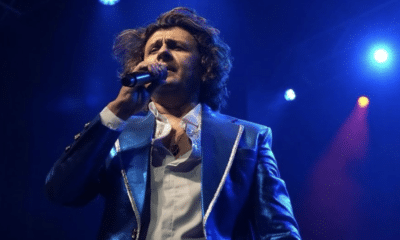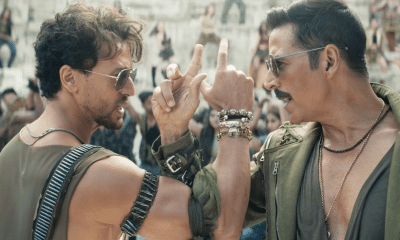Artist in Focus
Musicians, not MBAs, should have creative control over music: Composer Raghav Sachar
Music composer Raghav Sachar recently released a new cover of popular Nusrat Fateh Ali Khan song ‘Tu Mera Dil’. The multi-instrumentalist, who has a penchant for recreating old melodies, said it’s more of a tribute to the original with which he has a nostalgic connect. In an interview with plunge daily, the ace musician ruminated on art, post-covid life and state of music in the film industry. The 39-year-old also opened up about the machination of the music industry, lamenting the lack of creative control for composers.
Here are the excerpts of the interview:
1) How did you come up with the idea to recreate ‘Tu Mera Dil’?
‘Tu mera dil’ has been very close to my heart. Although, I loved the original, I wanted to create another version of this song since the beginning of my music career. The idea came during one of the jamming sessions with Mame bhai. The texture of his voice was perfect for this track, so I told him we can do a version of this song but I will have a different approach to it. When I recreate an old song, I don’t fiddle with the singing style I change the arrangement behind it. So, he came to our Mumbai studio and it took us nearly six hours to complete the recording. Then, suddenly this lockdown happened. So, most of the scenes for the video were shot separately except for the ones where we are jamming together.
2) You and Mame Khan come from different schools of music. So, please tell us about the experience of working with Mame Khan.
Mame bhai is more into Rajasthani folk music and here I tried to put him in jazz and big band kind of set up, pulling him out of his comfort zone. But he is such a prolific singer, it did not take him long to adapt to the situation. I wanted Tu Mera Dil to become a different kind of track with my saxophone portions and the brass section. Kudos to him for believing in my vision. He was very supportive through the entire process and when the end product came, he was very happy with it.
3) You have a prolific track record both as an indie musician and film composer. Do you see the gap bridging between indie music and film music?
There used to be a huge difference between indie music and film music in the 90s and early 2000s. You could have easily identified independent artists like Alisha Chinai and Daler Mehndi. It was easier to identify their music, the reason being, indie artistes were slightly modern and experimental in their approach. The film music was relatively stagnating. But that difference has certainly come down. If we take a Honey Singh song or a Badshah song for example, you can use the same track either in a film or in a music video. Also, most of the artists working today including myself, Adnan (Sani), Salim (Merchant), Shankar (Mahadevan) used to be independent musicians. So when we became bollywood composers, our sound also came into the film industry. So, the difference has certainly diminished.
Also as an independent musician what I do is far more experimental than film music. If this recreated version of ‘Tu mera dil’ had to be included in a film, it would have taken me ages to get it approved from the director. So when you compose for films, you are working somebody else’s vision but in indie, it’s largely your own baby which makes it all the more special. It has its pros and cons you don’t get enough funding to promote our music but film songs have enough funding it’s a two edged sword what you should do what you shouldn’t.
4) Please take us through your music journey and also tell us about your musical inspirations.
I don’t remember myself being without an instrument ever. I started very early at the age 4 with a harmonica. Every birthday I got a new instrument from my father. I am very grateful to God for giving me this ability to play so many instruments. Since I play so many instruments, every instrument has its own Guru for me. But from the Indian segment, it would be RD Burman, Rafi saab, Kishore da and you can see that in my recreations. I like recreating songs which are old or something that I grew up listening to and then convert them to my style of music.
5) As most of us know that you can play as many as 36 instruments and perform in multiple genres but there has to be one instrument or genre that draws you most.
Out of 36 instruments that I play, Saxophone and flute are particularly close to my heart. I have played these instruments in most of my songs and live concerts as well. The genre I am most drawn towards is funk and big band. This musical piece (Tu mera dil) that I have created with Mame bhai is exactly the kind of music that I love listening to and recreating. But this is the kind of music, India is not very familiar with. So it is a very difficult and challenging task to create something (in this genre) which will be commercially successful. Till the 80s, this kind of music was still being produced. It’s intelligent music, it was difficult to understand it. It was not like EDM or run of the mill kind of creations. There are intricate parts happening, If you hear it carefully. There are brass taps, sections and a lot of graph in the music. There is a funk guitar playing in the back and there is a very heavy bass line— slap bass is going on . The brass section is complementing the singer. Overall, this is the kind of music that I would keep creating even as it’s not very easy to sell.
6) In recent years, there has been tectonic shift in film music. Earlier, only a handful of singers ruled the industry but that seems to have changed. We are seeing a lot of singers coming into play. So, do you think the medium has become more democratic?
In the last few years, the reach has become easier. Earlier, it was very difficult for newcomers to get a stage as they were coming from different parts of the country. To be able to meet a music director and get a break was very difficult. , The opportunity was scarce not only because established musicians often got typecast but more importantly, the music creation process had to happen live. When Burman saab created music he would have an orchestra of 100 people playing together. They would prepare as a live concert and perform it together which also had a chance of human error so there was a big infrastructural cost involved in recording a song and executing it. Also, there were several arrangers arranging different sections of music. Under these circumstances, the possibility of a scratch artist getting a break became more difficult. Now the situation has changed because the entire live scene has gone out of the window. Everything is essentially programmed.
Multi-track recording has also changed the entire space and with intelligent learning you have people who are non-singers, even bad singers but they are sounding great because you can tune their voices to sound good synthetically. So, this phenomenon has given rise to multiple artistes trying their hands at a particular song. So if there is peculiar voice, a music director or producer likes then they choose that voice but more so, it become political if there is an artist who has signed with a particular music label. The label will tell us this is the artist you are going to record with. It is no longer the choice of a music director There is no denying that more people are getting opportunity to sing but the creative control has gone from creative people to non creative people
Also, there is an influx of new singers whom you could not identify. You have nearly 7 to 8 singers who sound exactly like Arijit Singh or Shreya Ghosal. It is a total khichdi. Music has to be made by musicians it cannot be made by an MBA who is sitting at a position. That’s an issue plaguing our film industry that creative people have very little control and the people with money take the call.
7) It’s a tough time for music artists given the pandemic situation around the world. How do you see an artist (specially the struggling one) surviving in the post-covid era.
Music community always comes at the forefront during the time of crisis be it fundraisers, free concerts or more but there is a clear cut arts and culture mismatch happening in India. We are not even realising how many people from the music industry have become jobless and homeless in the pandemic. Live concerts were the only thing that was keeping musicians alive including people like us. Our main income come from live concerts but it’s been around 2 years since we gave a public performance .Till the time this pandemic ends, say by end of next year, people would have lost families and hope. So, I would expect the government to do some kind of relief work for the people in music industry.










































